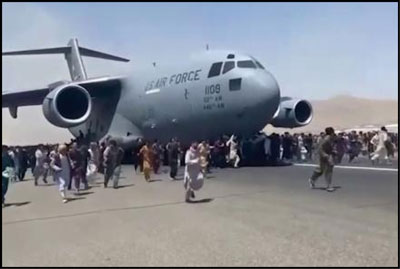A report by a Pentagon inspector general released this week said that officials had identified at least 50 Afghan evacuees who had been transferred to the US had “potentially significant security concerns.”
The report released on Thursday said that US agen-cies did not use all available data when verifying Afghan evacuees during the chaotic evacuation process after the fall of the former Afghan govern-ment.
The report said the National Ground Intelligence Center (NGIC) then expanded its review to address screening gaps. “50 Afghan personnel in the United States” had “information in DoD records that would indicate potentially significant security concerns,” the report said.
According to a footnote assigned to that section of the report, “significant security concerns include individuals whose latent fingerprints have been found on improvised explosive devices and known or suspected terrorists and for which the NGIC sends derogatory information notifications to appro-priate DoD personnel.”
The Afghans evacuated during the August evacua-tion tell their stories from another angle. “When we were at the Texas camp. There were many people who were criminals and fled from prisons,” said Noor Ahmad Mohammadi, a former military officer.
“Those who are here—we see them, they don’t look suspicious. They are academic people and scholars,” said Gulistan Maarij, an Afghan refugee in Abu Dhabi. “This was a sudden and rapid evacuation. Whoever consulted the US to conduct such an evacuation–it was wrong advice. This evacuation wasn’t correct,” said Nazeer Ahmad Mohabat, a university instruc-tor. —Agencies










